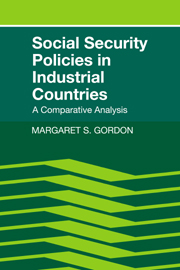Book contents
- Frontmatter
- Contents
- Preface
- Acknowledgments
- Abbreviations
- 1 Postwar developments
- 2 Differences in social security spending
- 3 National old-age pension programs: basic structure
- 4 Other major features of old-age pension programs
- 5 The age of retirement
- 6 Long-term invalidity programs
- 7 Industrial injuries programs
- 8 The role of employer pension plans
- 9 The economic impacts of pension programs
- 10 Health benefits
- 11 Unemployment compensation
- 12 Labor market policies
- 13 Family allowances and family policies
- 14 Public assistance and guaranteed income proposals
- 15 International linkages
- 16 Conclusions
- Appendix 1
- Appendix 2
- References
- Index
9 - The economic impacts of pension programs
Published online by Cambridge University Press: 06 July 2010
- Frontmatter
- Contents
- Preface
- Acknowledgments
- Abbreviations
- 1 Postwar developments
- 2 Differences in social security spending
- 3 National old-age pension programs: basic structure
- 4 Other major features of old-age pension programs
- 5 The age of retirement
- 6 Long-term invalidity programs
- 7 Industrial injuries programs
- 8 The role of employer pension plans
- 9 The economic impacts of pension programs
- 10 Health benefits
- 11 Unemployment compensation
- 12 Labor market policies
- 13 Family allowances and family policies
- 14 Public assistance and guaranteed income proposals
- 15 International linkages
- 16 Conclusions
- Appendix 1
- Appendix 2
- References
- Index
Summary
The income status of the aged
There is little question that the incidence of poverty among the aged has declined in most industrial countries during the postwar period, at least if poverty is defined as insufficient income for a subsistence level of living – sometimes referred to as “absolute poverty.” There is also some evidence of a decline in relative poverty – for example, the relative proportion of the aged with incomes below, say, 50 percent of average earnings.
The primary reason for the decline in poverty among the aged has been the expansion and liberalization of income maintenance programs for the elderly, discussed in earlier chapters. Also of substantial importance has been the provision of free or heavily subsidized medical care and, in some countries, housing subsidies. On the other hand, the sharp decline in the labor force participation of elderly men has acted as a countervailing force because, on the average, income from employment tends to exceed retirement income. Thus we may view the changing income status of the aged as the net result of two conflicting forces: improved retirement income versus reduced employment income. We must also keep in mind the fact that improved retirement income has enabled many older people to live independently, whereas in former times substantial numbers of aged people, particularly women, lived with relatives in a state of dependency. The increase in the proportion living independently has tended to retard the increase in measured income.
- Type
- Chapter
- Information
- Social Security Policies in Industrial CountriesA Comparative Analysis, pp. 179 - 196Publisher: Cambridge University PressPrint publication year: 1989



